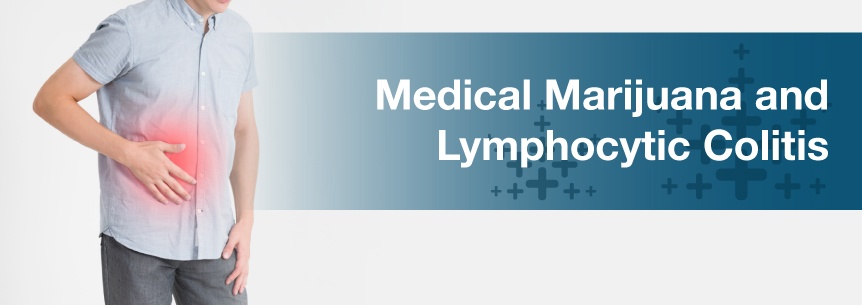
If you’ve just received a diagnosis for lymphocytic colitis from your doctor, you’re likely trying to get as much information about it as you can. By gaining knowledge about lymphocytic colitis, including what treatment options you have, you’ll have a better chance of managing your symptoms and leading a more comfortable, fuller life. To ease your symptoms and get your condition under control, you’ve likely been using numerous conventional treatments. Another treatment you may want to consider is medical marijuana.
Lymphocytic colitis is a medical condition resulting from large intestine inflammation. It also causes episodes of stomach pain and chronic watery diarrhea.
Inflammatory immune system cells travel to the large intestine in lymphocytic colitis. Here they cause inflammation and swelling of the tissues. Lymphocytes (immune cells) might also build up in this area. This inflammation might prevent your large intestine from properly reabsorbing the amount of water it should, resulting in stomach pain and watery diarrhea.
Lymphocytic colitis is a form of inflammatory bowel disease (IBD). IBD is a group of disorders leading to inflammation in your large or small intestine.
Lymphocytic colitis is also a form of microscopic colitis. Collagenous colitis is the other primary form of microscopic colitis. Microscopic colitis is large intestine inflammation only noticeable using a microscope and not visible on the surface of the colon with the naked eye. Some experts believe collagenous and lymphocytic colitis could be the same condition but presented in different ways.
Lymphocytic colitis isn’t a common disorder. However, older adults seem to get it most, particularly those between 60 and 80 years old. It can affect children and younger adults too. Women tend to develop lymphocytic colitis more frequently than men. The condition is also commonly seen in people with celiac disease.
Experts are still trying to identify what causes the large intestine inflammation resulting in lymphocytic colitis.
Some individuals believe a gastrointestinal (GI) tract substance could be triggering this abnormal immune response. This could be pollen or food. In some individuals, certain types of food can trigger the disorder. Some foods could make the symptoms of lymphocytic colitis worse, including dairy, caffeine and artificial sweeteners.
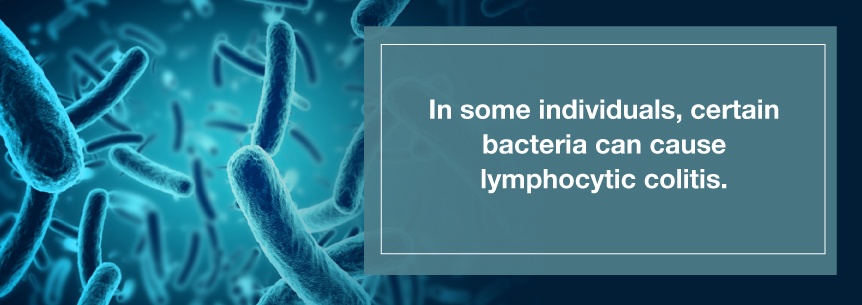
In some individuals, certain bacteria can cause lymphocytic colitis. You may develop your first episode after you become sick from bacteria. Types of bacteria that commonly cause colitis include Clostridium difficile or Campylobacter jejuni. Bacteria toxins might harm your large intestine’s inner surface causing inflammation. Some experts believe specific viruses might contribute to lymphocytic colitis.
Some people may develop the condition by taking certain medications. These medications could include:
If not properly absorbed, bile acid could irritate the lining of the colon.
Celiac disease, rheumatoid arthritis and other autoimmune diseases causing your body’s immune system to attack healthy tissues can also cause lymphocytic colitis.
Having certain medical ailments could also increase your risk for the condition. Common pre-existing conditions include celiac disease, diabetes and irritable bowel syndrome (IBS).
Chronic, watery diarrhea is the primary lymphocytic colitis symptom. There’s no blood in this diarrhea, and you could have a few cases of this diarrhea each day potentially lasting for weeks or even months. For many individuals, diarrhea goes away for a bit but returns later.
Other lymphocytic colitis symptoms might include:
If you’re experiencing watery diarrhea lasting more than three days, consult with your doctor for a proper diagnosis and treatment.
Untreated, the condition could progress and lead to different complications like:
Because symptoms of microscopic colitis are similar to IBS, many microscopic colitis patients could receive a misdiagnosis of IBS.
IBS symptoms could cause depressive symptoms. Some individuals worry their diarrhea or other symptoms might flare up, so they avoid school, work or going out with friends. They might lose interest in activities or their social lives. They might feel irritable or restless. These are all depression symptoms.
And since microscopic or lymphocytic colitis shares similar symptoms with IBS, it’s safe to say some patients will likely struggle with depression or anxiety with lymphocytic colitis as they do with IBS. These mental effects, along with the physical effects, can lead to a decline in the patient’s quality of life.
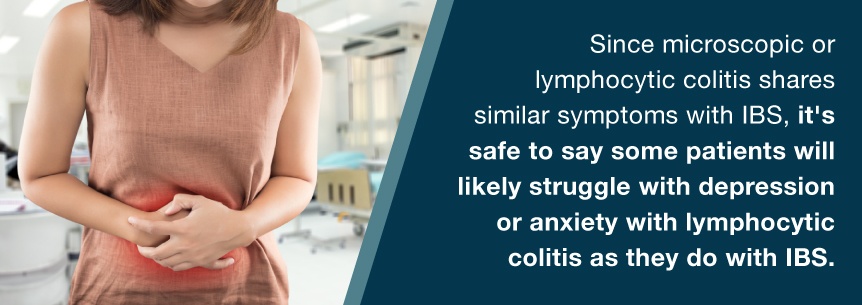
Facts about lymphocytic colitis, according to the National Institutes of Health (NIH) include:
Microscopic colitis, in all its forms, including lymphocytic colitis, has often been misdiagnosed, misunderstood and inadequately treated. This is partly because it’s a fairly recent diagnosis. Microscopic colitis was first described only a few decades ago.
Back in 2004, Martin Olesen and his colleagues published data showing the yearly incidence of microscopic colitis in all its different forms is substantially higher than what most medical professionals commonly believe. In fact, in Sweden, they found the yearly incidence of microscopic colitis approached the incidence of ulcerative colitis and matched the incidence of Crohn’s disease.
If you suspect you have lymphocytic colitis, you might want to see a gastroenterologist who has special training in treating digestive tract problems. They’ll ask you about your symptoms and medical history. They’ll give you an exam, also examining your abdomen. They’ll first rule out other reasons for your diarrhea, including another inflammatory bowel disease or infection.
They may perform other tests, including:
You might require a colonoscopy, which examines your rectum and colon lining using a tiny camera and light. Even if you have lymphocytic colitis, the colon usually looks normal during a colonoscopy. Your healthcare provider might collect some colon tissue samples during the colonoscopy to examine the sample under a microscope to determine if you have lymphocytic colitis.
In some cases, microscopic colitis could go away on its own. If it doesn’t, your doctor may recommend a few things such as:
Your doctor might recommend certain medications if these three steps above don’t work. These medications may include over-the-counter (OTC) drugs for stopping diarrhea. Side effects of these may include:
If those don’t work, your doctor may suggest prescription medications for reducing swelling like steroids or sulfasalazine. Side effects of steroids might include:
If these treatments aren’t working, you might require medicines to suppress your immune system like azathioprine. Side effects of azathioprine include:
Another option is surgery, although very few people require it.
For many individuals with microscopic colitis, treatment is typically effective. Some individuals relapse once they stop treatment.
Budenofalk — budesonide in a gastro-resistant pill — once-daily shows potential as a lymphocytic colitis oral treatment, according to a phase III study. Some small studies suggest budesonide in its oral form is helpful for lymphocytic colitis, but researchers are calling for further randomized trials.
Medical marijuana has shown to address IBS symptoms effectively. The cannabinoids in marijuana:
Because of this, medical weed use is common in individuals with IBS. And, IBS is a qualifying condition for medical marijuana in many states, including Minnesota, New Jersey, New York, Ohio and Pennsylvania.
A 2016 study showed 17.6 percent of IBS patients use cannabis to ease their symptoms. Those who use marijuana report improvement in abdominal cramping, abdominal pain, diarrhea and joint pain.
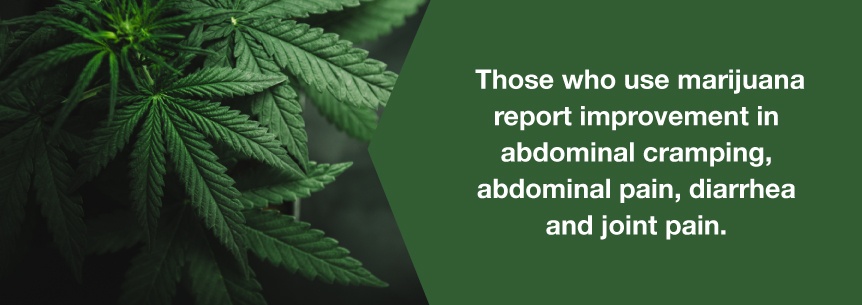
A study from 2011 observed CBD’s effectiveness as a treatment for intestinal inflammation. The study found CBD administration after inducing inflammation, decreased the inflammation and CBD administration before inducing inflammation prevented the occurrence of the inflammation altogether. The study also indicated CBD worked as a strong anti-inflammatory on a sample of tissue doctors took from ulcerative colitis patients. CBD helped effectively on both a biopsy of tissue doctors took from individuals during remission and tissue taken during their active disease phases.
A 2010 study by the British Journal of Pharmacology examined the effects of THC and CBD on colitis in rats. The researchers induced intestinal inflammation in rat models to test how effective cannabinoids were in managing and treating the inflammation compared with a long used anti-inflammatory drug, sulphasalazine.
According to the study, the THC in medical marijuana, when dosed correctly, was the most effective drug. Although CBD wasn’t effective by itself, it did help improve THC’s effectiveness. The herb protected cholinergic nerves while sulphasalazine didn’t and wasn’t as effective as THC. The study also found lower THC doses mixed with CBD was more effective than higher THC doss alone at fighting inflammation. THC, both combined with CBD and alone, also improved colonic muscle movement function, unlike sulphasalazine.
May symptoms of lymphocytic colitis can be treated with medical cannabis, including:
Some cannabis strains to try for lymphocytic colitis include:
Indica strains are sedating and relaxing while sativa strains provide uplifting, cerebral effects. Hybrids are believed to fall in between the sativa-indica spectrum depending on the traits they inherit from the parent strain. Your dispensary budtender can help you choose the best strain for you.
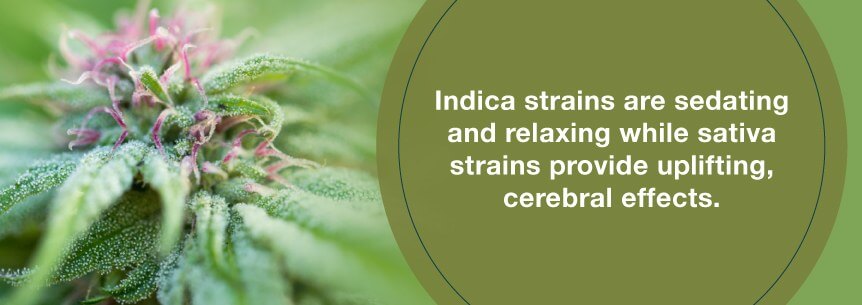
There are many good ways to administer medical marijuana when treating lymphocytic colitis. Smoking and vaping deliver quick effects but negatively impact the respiratory system. Edibles have long-lasting effects, but you’ll want to make sure there aren’t any ingredients that can make your colitis worse. Sprays or tinctures placed under the tongue might be the best method of treatment. Again, your budtender can help you choose the best treatment method for you.
In recent years, the healthcare community has started realizing the benefits of medical cannabis. It doesn’t have the stigma wrapped around it anymore because of how effective it is in treating various conditions. If you are looking for a natural alternative to treat your lymphocytic colitis symptoms, MarijuanaDoctors.com can help. Search for a marijuana dispensary and connect with cannabis doctor today.
Find A Doctor Find A Dispensary